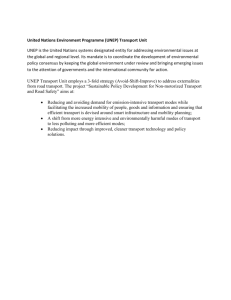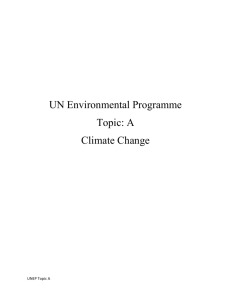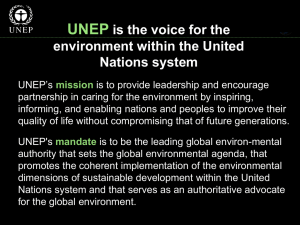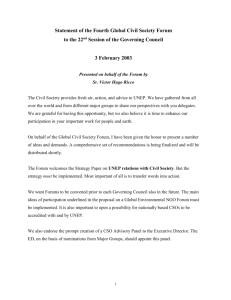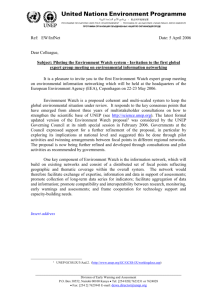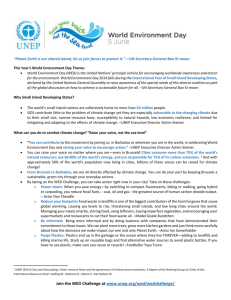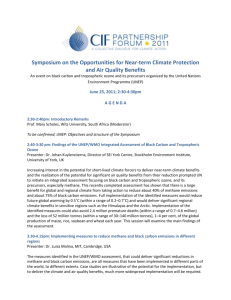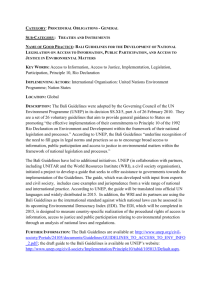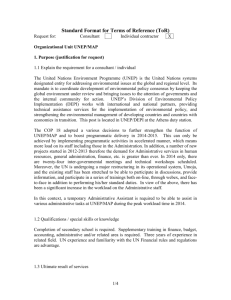Civil Society engagement in programme design and
advertisement
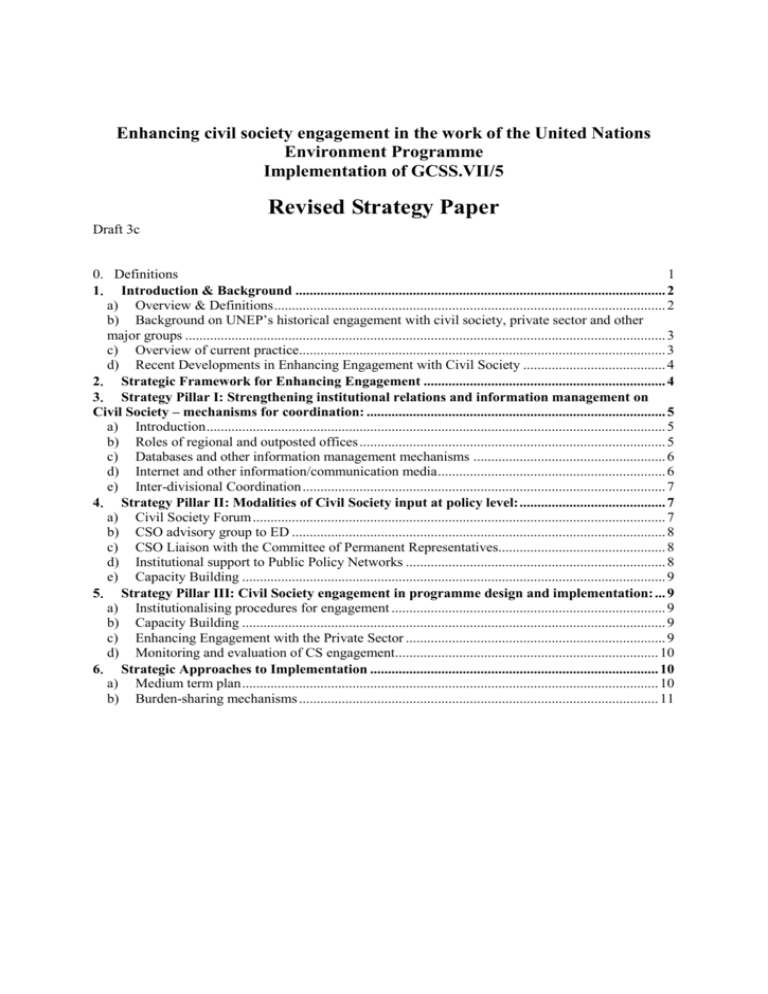
Enhancing civil society engagement in the work of the United Nations Environment Programme Implementation of GCSS.VII/5 Revised Strategy Paper Draft 3c 0. Definitions 1 1 Introduction & Background ........................................................................................................ 2 a) Overview & Definitions .............................................................................................................. 2 b) Background on UNEP’s historical engagement with civil society, private sector and other major groups ....................................................................................................................................... 3 c) Overview of current practice....................................................................................................... 3 d) Recent Developments in Enhancing Engagement with Civil Society ........................................ 4 2 Strategic Framework for Enhancing Engagement .................................................................... 4 3 Strategy Pillar I: Strengthening institutional relations and information management on Civil Society – mechanisms for coordination: .................................................................................... 5 a) Introduction ................................................................................................................................. 5 b) Roles of regional and outposted offices ...................................................................................... 5 c) Databases and other information management mechanisms ...................................................... 6 d) Internet and other information/communication media ................................................................ 6 e) Inter-divisional Coordination ...................................................................................................... 7 4 Strategy Pillar II: Modalities of Civil Society input at policy level: ......................................... 7 a) Civil Society Forum .................................................................................................................... 7 b) CSO advisory group to ED ......................................................................................................... 8 c) CSO Liaison with the Committee of Permanent Representatives............................................... 8 d) Institutional support to Public Policy Networks ......................................................................... 8 e) Capacity Building ....................................................................................................................... 9 5 Strategy Pillar III: Civil Society engagement in programme design and implementation: ... 9 a) Institutionalising procedures for engagement ............................................................................. 9 b) Capacity Building ....................................................................................................................... 9 c) Enhancing Engagement with the Private Sector ......................................................................... 9 d) Monitoring and evaluation of CS engagement.......................................................................... 10 6 Strategic Approaches to Implementation ................................................................................. 10 a) Medium term plan ..................................................................................................................... 10 b) Burden-sharing mechanisms ..................................................................................................... 11 Definitions Civil Society Organizations (CSOs): For the purpose of this strategy, UNEP uses the definition as set out in decision GCSS.VII/5 of the seventh special session of the Governing Council/Global Ministers of the Environment Forum. Civil society encompasses major groups, namely farmers, women, the scientific and technological community, children and youth, indigenous people and their communities, workers and trade unions, business and industry, non-governmental organizations as well as local authorities. The strategy focuses on engagement with the organizations established by each of these major groups in so far as they engage in public interest activities. Public Policy Networks (PPNs): Multi-stakeholder processes established to build consensus around specific public policy issues. PPNs bring together representatives from different major groups, as well as government and inter-governmental bodies, who may initially have opposing views on the issue being addressed. The World Commission on Dams is often cited as a prime example of a PPN. 106741250 / 16 February 2016 1 Enhancing civil society engagement in the work of the United Nations Environment Programme Implementation of decision GCSS.VII/5 Revised Strategy Paper Draft 3b 1 Introduction & Background In decision GCSS.VII/5 of the seventh special session of the Governing Council/Global Ministers of the Environment Forum (GC/GMEF) of the United Nations Environment Programme the Executive Director was requested “to further develop, and review and revise as necessary the strategy for engaging civil society in the programme of activities of the United Nations Environment Programme, in consultation with Governments and civil society. The strategy should provide clear direction to the secretariat to ensure that all programmes take into account opportunities for multi-stakeholder participation in design, implementation, monitoring of activities, and dissemination of outputs”. This decision was a reflection of the strong interest expressed by the member states of UNEP to see the organization playing a stronger role in catalysing effective action to protect the environment through enhanced collaboration with the multitude of civil society actors who share the same purpose and values around the world. In accordance with this request, the Executive Director has developed the following strategy to enhance UNEP’s engagement with civil society, including the private sector, in its programmes and activities. The strategy proposed in this paper has been derived from consultations and communication over the past year and a half with many representatives of civil society constituencies, as well as with UNEP programmes and the Governing Council and its Committee of Permanent Representatives (CPR). a) Overview & Definitions The United Nations Environment Programme (UNEP) owes much to civil society for its establishment. In 1972 the global community for the first time met to discuss global environmental issues, and their Stockholm Declaration recognised the important role civil society has to play. Thus UNEP, at its creation, was encouraged to work together with civil society. Civil society is a natural ally of UNEP - an ally in working with peoples, governments, and non-state organizations. The role of civil society organisations – including representatives of the private sector in the design, implementation and monitoring of a range of projects and programmes is widely recognised. Over the past 30 years UNEP has established a strong linkage with civil society. Through its support to civil society participation in preparations for UNCED, and during the negotiations for the “Rio Conventions”, as well as by recognition of the importance of partnerships with civil society organizations (CSOs) in the Nairobi and Malmö Declarations, these linkages have been clearly established. Engaging stakeholders as partners is important for the following reasons: External stakeholders have many different perspectives to be taken into account in order to foster long-term, broad-based support for UNEP’s work. Engaging a wide range of stakeholders in addressing environmental issues expands the reach and impact of strategies far beyond the capability of UNEP’s own limited financial and human resources. Active involvement of stakeholders at the national level, where many environmental problems need to be addressed, and where many of UNEP’s programme partners are located, complements UNEP’s operational presence at the regional and global levels. 106741250 / 16 February 2016 2 For the purpose of this strategy, civil society encompasses major groups, that is farmers, women, the scientific and technological community, children and youth, indigenous people and their communities, workers and trade unions, business and industry, non-governmental organizations as well as local authorities. The strategy focuses on engagement with the organizations established by each of these major groups in so far as they are involved in public interest activities. b) Background on UNEP’s historical engagement with civil society, private sector and other major groups The Stockholm Conference on the Human Environment in 1972 and the accompanying NGO Forum marked a breakthrough in the way major groups related to and sought to influence an intergovernmental decision making process. From its inception, UNEP promoted a policy to invite wide NGO input and collaboration. An NGO Section was set up in 1973. This office was charged with coordinating UNEP's programmatic activities with parallel efforts of NGOs. In 1974 an independent coalition of environmental NGOs was established as the Environment Liaison Centre to connect groups around the world with the work of UNEP. The 1980s saw UNEP forging new links with a wide variety of major groups. These included: women’s groups (1985 World Conference on Women in Nairobi); religious groups (1984 launching of "UNEP Environmental Sabbath"); business and industry (1984 "World Industry Conference on Environmental Management”); children and youth (Global Youth Forums and a network of youth advisors for various regions). In 1985 a strategy to set up UNEP national committees began. The UN Conference on Environment and Development (UNCED) in 1992 is often recognized as the point at which civil society truly became a full player in the global decision-making arena. Civil society had, by then, built up its capacity and legitimacy and had grown to become a prominent voice in policy discussions. Agenda 21 calls on UNEP to raise “general awareness and action in the area of environmental protection through collaboration with the general public, non-governmental entities and intergovernmental institutions” (Chapter 28). In 1995, the Governing Council called upon UNEP to develop a framework for working more closely with NGOs. Consequently, UNEP agreed to support NGO and Major Group input into project design, implementation and evaluation, UNEP policy development as well as environmental governance. These decisions were formalized in UNEP’s Project Manual. c) Overview of current practice At the operational level, there are many examples of successful engagement with civil society by UNEP programmes. These include: Expanding and enhancing regular communication and consultation with CSOs through the establishment in 2000 of the NGO/civil society Unit in the Division of Policy Development and Law (DPDL), promoting mechanisms for engagement with CSOs in information-sharing and assessment activities, such as with the Global Environmental Outlook (GEO), UNEP.Net and Infoterra, identifying and collaborating with CSOs in the design and implementation of GEF medium sized projects, including work with indigenous peoples and biodiversity, fostering strong CSO constituencies by convention secretariats and regional and out-posted offices, implementing special initiatives jointly with civil society actors, such as the Coral Reef Initiative. The Communication and Public Information Division implements several projects in partnership with civil society and private sector groups, and has spearheaded UNEP’s outreach to youth organizations. UNEP also undertakes extensive work with educational organizations on environmental education. 106741250 / 16 February 2016 3 Representing business and industry, associations from various sectors and all regions participate in the annual consultative meeting of UNEP with industry and trade associations, where they have the opportunity to advise UNEP DTIE on the execution of its work programme. UNEP has engaged with industry and business associations to promote cleaner production, management of industrial pollution, and voluntary environmental initiatives. A major aspect of this role has been to establish partnerships with the private sector, to launch corresponding outreach activities, to disseminate information and implement activities in the regions. UNEP also collects information regarding the relevant needs of the countries and private sector groups. Key examples of voluntary initiatives promoted by UNEP include: The Financial Institutions Initiative The Insurance Industry Initiative The Tour Operators Initiative for Sustainable Tourism Development A Telecommunications Initiative The Global Reporting Initiative (GRI) The Global Compact initiative of the United Nations Secretary-General d) Recent Developments in Enhancing Engagement with Civil Society In the spirit of the Nairobi and Malmö Declarations, the UNEP Governing Council, in early 2001, called on the Executive Director “to further the consultative process, including at the regional level, with Governments, the civil society, private sector and other major groups on ways and means to enhance the active engagement and participation of civil society in the work of the United Nations Environment Programme”. Subsequently, the seventh special session of the GC/GMEF, in February 2002, requested the Executive Director, inter alia, “to further develop, and review and revise as necessary the strategy for engaging civil society in the programme of activities of the United Nations Environment Programme,” and “to consider the best way to include the views of civil society in the proceedings of the Governing Council/Global Ministerial Environment Forum.” As a result of these decisions, the past year has witnessed an acceleration of consultations and collaborative thinking on how UNEP should be working with civil society and the private sector in order to enhance commitment and effectiveness in addressing the environmental and sustainable development challenges of the 21st century. Global and regional meetings have been convened with civil society representatives to gather their views on engagement with UNEP, and electronic consultations have also been conducted. In this endeavour it is clear that the way forward is to build stronger bonds among the multitude of constituencies and major groups engaged with UNEP. 2 Strategic Framework for Enhancing Engagement It is clear from the above that UNEP already engages with civil society in a wide variety of ways and at numerous levels. So the issue is not so much how to increase engagement, but how to make it more effective in supporting UNEP’s mandate and objectives. This is necessary in order to respond to the evolving context of international governance as it relates to the formulation and implementation of environmental and sustainable development policy. There are two principal focuses for engagement with civil society. One is at the level of governance and policy formulation, the other is at the level of programme operations. As these two focuses are quite distinct, they are treated as two of three pillars in the new UNEP strategy for engaging civil society. What they have in common is a need for an institutional environment with good information and communication mechanisms in order to ensure qualitative exchange between UNEP and its partners at both the policy and the programmatic levels. This institutional environment forms the 106741250 / 16 February 2016 4 third pillar, although it will be addressed first since it underpins the strategies for addressing the other two. The strategy will emphasize an incremental approach, building on current mechanisms and practices, and envisioning activities and innovations to strengthen civil society engagement over three to four years, after which the strategy should be reviewed. The fact that it would be unrealistic to propose new activities that will require mobilization of substantial financial resources that patently are not available, argues for such an approach. In addition, any strategy that aims to enhance the quality of inter-institutional relationships must take into account that attitudes towards and practices of “working together” cannot be made to change overnight. It takes time to build trust and harmonious relations. This does not mean that UNEP will in any way delay implementation of the strategy. On the contrary, demands for a stronger role in engaging civil society in addressing the global environmental agenda, particularly in the follow-up to the WSSD, require that the organization move forward expediently in this area. To this end the Secretariat will commence implementation of the strategy before the end of 2002, concentrating on components that will provide the foundation for other changes. These will include strengthening of information/communication systems, developing regional strategies for enhanced engagement, and preparing for a CSO forum to coincide with the 22nd session of the GC/GMEF in February 2003. 3 Strategy Pillar I: Strengthening institutional relations and information management on Civil Society – mechanisms for coordination: a) Introduction In decision GCSS.VII/5 in Cartagena, the GC/GMEF further requested “the Executive Director to review the practices of civil society engagement in other United Nations agencies, as well as precise modalities of civil society engagement, including involvement of the private sector in the work of the United Nations Environment Programme to achieve constructive partnership with the business community. This involvement should be further discussed, developed, and formulated in consultation with the representatives of civil society and under the guidance of the Committee of Permanent Representatives. Frequent concerns expressed in consultations relate to information management about and for CSOs. Concerns include: lack of information about who is doing what with which CSOs; how to find appropriate CSOs to engage with; questions of the legitimacy of organizations as representatives at international forums; how CSOs can interact with each other to have more effective input to UNEP, etc. There are many ways that CSOs interact with UNEP, and all divisions have some level of engagement with civil society, but coordination has been weak. Until 2000 there was no programme dedicated solely to civil society matters – although matters have been somewhat different with respect to the private sector, where the Division of Technology, Industry and Economics is dedicated to address this sector. Apart from the outreach programme run under the former Information and Public Affairs Branch, the rest of the major groups have not had a comparable and consistent access. Another inhibiting factor has been the lack of a national level presence for UNEP, where much civil society activity takes place. The first pillar of the strategy to strengthen engagement of civil society must therefore address such issues of institutional and information-communication support mechanisms. Special focus will be given in this area to addressing the needs of CSOs from developing countries. b) Roles of regional and outposted offices Regional and outposted offices will be the “front line” in implementation of the CS engagement strategy. Regional Offices need to be proactive in strengthening and working with national and regional CSO networks, and these should have a link with global forums. Funding sources will need 106741250 / 16 February 2016 5 to be found to support the Regional Offices in this activity, particularly for identifying appropriate CSO partners and convening periodic consultations with them in order to foster regional networking structures. Regional Offices, as the primary contact point with CSOs, will play a lead role in fostering programmatic engagement. Regional Offices will help delivering UNEP outreach to business and industry, and will have primary responsibility for database management (see below). c) Databases and other information management mechanisms A new civil society (CS) database is under development by the CS Unit, which will oversee its longterm maintenance in collaboration with the Division of Early Warning and Assessment (DEWA). It will be linked to the Environmental Directory. It will be the job of the CS focal point in each regional office, however, to ensure the accuracy and regular updating of the database for their respective region. The database will hold qualitative data on UNEP-CS engagement history, areas of expertise and basic contact information. It will also be the mechanism for managing information to be used for accreditation and programme partnership identification purposes. Better quality information management systems will support the strengthening of accreditation procedures. By viewing accreditation and assessment procedures as a facility in the engagement process beyond mere participation in governance activities, it takes on a much broader role as, in a sense, a gateway to engagement. Well-formulated assessment criteria can assist UNEP to identify CSOs with capacity and areas of technical expertise that can be valuable for programme implementation. UNEP will improve its support to business and industry in the areas of capacity building and technology through its databases such as: - MaESTro information system of UNEP IETC, providing a database on environmentally sound technology products and contacts. - Sustainable Alternatives Network (SANet), and web portal system to disseminate information and advance a network of partnerships to replicate win-win solutions in the field of technology transfer. d) Internet and other information/communication media UNEP.Net can be a prototype for modalities to guarantee independent voice and participation by civil society, as well as an opportunity for capacity-building and fostering national and regional networking. UNEP.Net is the global environmental information portal being developed by UNEP in cooperation with a diverse range of partner institutions world-wide, and CSOs have a key role to play in this implementation process. UNEP.Net will provide national CSOs with a practical mechanism to promote their activities and joint cooperation with UNEP, making use of a CSO section of the country profile, which can evolve into a comprehensive NGO bulletin board. This will facilitate two-way information exchange between UNEP and CSOs at the national level as recommended in the UN Secretary-General’s Task Force on Environment and Human Settlements. Some of the most dynamic civil society activity over the past decade has been built on internet-based communication systems. List-serves, on-line conferences, and other such mechanisms have supported information sharing and technical advice, consensus-building around specific issues, early warning of emerging environmental threats, joint advocacy for policy change, etc. In fact, there is so much activity of this nature that it is often difficult to find the information channels most relevant to an organization’s needs. It should be noted, however, that the predominant users of these technologies are in the developed countries. An important role that can be played by UNEP.net is to provide a service to link CSOs at the local and national level with related internet-based activity. This will focus especially on increasing the participation in such activity by CSOs from developing countries and countries with economies in transition. 106741250 / 16 February 2016 6 There need to be put in place mechanisms for strengthening communication with UNEP’s civil society constituency. When it is fully operational UNEP.Net and the CS database will provide the primary contact base for such communication. The CS Unit will be responsible for providing regular communication to this contact base on matters of interest to the constituency. There are numerous communication tools that can be utilised to strengthen the engagement of civil society, and the CS Unit in consultation with the interdivisional working group (see below) will design a comprehensive strategy to fulfil its outreach potential. The communication strategy will aim to ensure that UNEP’s outreach to civil society becomes more than simply an information dissemination process, but rather a mechanism of engagement through which organizations interact in dialogue with UNEP and with each other, share information and identify emerging issues. With specific reference to business and industry, UNEP will continue to prepare and update technical publications and electronic information systems on cleaner and safer production, environmental technologies and sustainable consumption. This will be done through: - sector specific websites related to its voluntary initiatives with industry sectors and its work on chemicals, ozone, energy and trade; - improved electronic information systems for information exchange and promoting dialogues on key issues and policies, including its: Mineral Resources Forum, Offshore Oil and Gas Environment Forum, and Sustainable Agri-food Production and Consumption Forum. e) Inter-divisional Coordination Every UNEP division – as well as regional and out-posted offices – will have a focal point for CSO issues. The Civil Society Unit in isolation cannot achieve the mainstreaming of CSO engagement. Integration will require a focused effort by all parts of UNEP. The CS Unit will therefore coordinate with the different programmes to identify CSO focal points, and establish a working group that will meet on a monthly basis to address common issues related to CSO engagement, advise the Unit, and support the implementation and evaluation of the civil society engagment strategy. The working group will also examine possibilities for a more coordinated approach to working with the various major groups. At present groups such as women/gender, youth, NGOs and the private sector are all dealt with by separate programme divisions, as are UNEP National Committees, which cross over several major groups. This diversity of approaches calls for a more systematic framework, which the inter-divisional working group will be naturally placed to address. 4 Strategy Pillar II: Modalities of Civil Society input at policy level: In decision GCSS.VII/5 in Cartagena, the GC/GMEF requested “the Executive Director to continue the current practice of convening a civil society forum that is regionally balanced and representative in conjunction with the meetings of the Governing Council/Global Ministerial Environment Forum in close consultation with civil society”. It further invited “the Executive Director to consider the best way to include the views of civil society in the proceedings of the Governing Council/Global Ministerial Environment Forum”. Several mechanisms are planned to implement these decisions of the Governing Council. a) Civil Society Forum Decision GCSS.VII/5 has to a certain extent institutionalized the convening of global CS forums to coincide with GC/GMEF meetings. The challenge now is to develop mechanisms that will strengthen the quality of input from these forums to the GC/GMEF, both in terms of the competence of the participating CSOs, and how they are facilitated to bring relevant, helpful, consensus views to the GC/GMEF. The regional networking will be the main strategy to support this. This multi-stakeholder body will meet prior to the GC/GMEF meetings, to reflect on issues of major concern to UNEP and 106741250 / 16 February 2016 7 the Governing Council, and to make recommendations on these matters arising from their meetings. Such a body shall not have any decision-making role in UNEP. It is proposed as well that multistakeholder “dialogue sessions” be organized at future GC/GMEF sessions, where representatives of major groups participating in the CS forum will engage with government delegations in discussions on the issues being addressed in the GC/GMEF session. In consideration of the need to ensure that such stakeholder contributions reflect a balanced representation from all regions, as well as reflecting as much as possible the views of local and national level stakeholders, Regional Offices will play a key role in facilitating participation. To this end, the strategy envisions increased support for the convening of sub-regional and regional multistakeholder forums, on the model of the World Summit on Sustainable Development (WSSD) preparatory process. These regional processes would nominate representatives to the global forum. Extra resources will need to be allocated to ensure the participation of CSOs from developing countries and countries with economies in transition. In order to identify relevant participants for the sub-regional and regional forums, UNEP’s Regional Offices will work in consultation with national level umbrella groups or networks of major groups, or with National Councils for Sustainable Development (NCSDs), UNEP National Committees, or other appropriate civil society entities. Where such bodies do not exist, governments can be requested to convene multi-stakeholder meetings that can select representatives to regional meetings, as well as deliberate and provide recommendations on substantive issues. In either case, an important part of the function of Regional Offices in this process will aim to strengthen capacity of national bodies in building consensus around environmental issues. The Civil Society Unit will work closely with the Regional Offices to design and implement this component of the strategy. b) CSO advisory group to ED A mechanism will be established (possibly as a standing committee) for providing ongoing advice to the Executive Director. They will meet as required by the Executive Director, but will form a nucleus of civil society partners who as individuals can provide qualitative input to policy and programme strategy formulation (see also under Pillar III). Members of this committee will be selected by UNEP on the basis of their experience and expertise in environmental and sustainable development issues, and will, as much as possible, be members of existing CSO networks focused on the multi-lateral environmental agreements or other international environment and sustainable development processes. c) CSO Liaison with the Committee of Permanent Representatives The Committee of Permanent Representatives (CPR) is responsible for much of the intersessional work of the GC/GMEF. It would be useful for the CPR in pursing its function to benefit from the views of civil society on the matters under its consideration. To this end the Secretariat will develop mechanisms for improved information exchange between the CPR and CSOs, in consultation with the CSO Advisory Group to the Executive Director. d) Institutional support to Public Policy Networks The regional networks and information system should assist the identification of participants in PPNs. UNEP should build in-house capacity to support PPNs as issues emerge to be addressed in this way. The CSO advisory group to the Executive Director will play an instrumental role in assisting the design of this mechanism. UNEP will continue its role in the creation of new and the operation of existing public policy networks related to industry. A key example is the Global Reporting Initiative (GRI), initiated by UNEP and a global network of stakeholders to provide guidelines for sustainability reporting, advancing transparency and public accountability. The GRI will be established as a permanent institution, a UNEP collaborating centre with a multi-stakeholder Board and Advisory Council. 106741250 / 16 February 2016 8 e) Capacity Building Improving the effectiveness of CSO contributions at the policy level will require strengthening capacity to participate, especially for NGOs from developing countries and from Central/Eastern Europe and countries with economies in transition. The Civil Society Unit will develop training initiatives to support this, possibly in collaboration with the UN Non-governmental Liaison Service (NGLS). If such training were conducted as part of periodic civil society meetings, the cost implications will be minimal. 5 Strategy Pillar III: Civil Society engagement in programme design and implementation: In decision GCSS.VII/5, the GC/GMEF directed that “The strategy should provide clear direction to the secretariat to ensure that all programmes take into account opportunities for multistakeholder participation in design, implementation, monitoring of activities, and dissemination of outputs.” It also requested the Executive Director to report to the twenty-second session of the Governing Council on the progress made in the enhancement of civil society engagement in the work of the United Nations Environment Programme” a) Institutionalising procedures for engagement As requested in decision GCSS.VII/5, a more systematic and proactive implementation of the UNEP NGO policy needs to be pursued, to ensure that inclusion and consideration of CSOs in design of activities is a standard requirement. Programme/project planning procedures will require documented consideration of how civil society and private sector will participate in the various stages of the activity. UNEP’s programme manual will be amended to provide more detailed guidance on modalities for engagement of CSOs in project/programme design, implementation, and monitoring. UNEP needs to strengthen the CS Office with human and financial resources, to act as secretariat for the forums and the inter-divisional task group, CS information management, and to develop a training program to address internal and external capacity building, as described above. The CSO Advisory Group to the ED will play a key role in enhancing programme engagement, in addition to its role at the policy level. As a group they will advise the secretariat on development of engagement guidelines, capacity building needs, and monitoring and evaluation of CSO engagement practices. b) Capacity Building Improving the effectiveness of CSO skills in project design and management in order to strengthen engagement at the programme level will be required. UNEP training projects (e.g. in environmental law) should accommodate CSO participants, and training programmes can be targeted specifically at CSOs, such as environmental advocacy and awareness raising, and fundraising skills. A key tool for programme engagement capacity building will be an operational manual for CSOs, to increase awareness of the opportunities for working with UNEP, and build understanding of the policies and procedures for doing so. This will be a particularly important tool for Regional Offices to expand their outreach to and support for CSOs within their regions. c) Enhancing Engagement with the Private Sector UNEP will continue to engage business and industry and related CSOs in multi-stakeholder voluntary initiatives by industry sector. Cross-sectoral voluntary initiatives will also be developed to promote cleaner production and sustainable consumption, working with fellow UN organisations, research 106741250 / 16 February 2016 9 partners and stakeholder groups, exapanding and building on the experience of existing initiatives such as the Life Cycle Initiative, Global Reporting Initiative, and UN Global Compact. In follow-up to the WSSD, UNEP will expand involvement of CSOs in preparation of industry sector reports for Johannesburg+5, building on the consultative process of creating industry sector reports that was completed for WSSD 2002. The reports will indicate progress made with the implementation of the Johannesburg Programme of Action (JPOA). Greater contributions from the developing world will be advanced through regional meetings by sector, organised with UNEP regional offices in order to help industry associations set up regional processes. d) Monitoring and evaluation of CS engagement Learning mechanisms are needed to guide future policy development with respect to civil society engagement. Indicators for monitoring/evaluating quality and impact of multi-stakeholder approaches will be established. This will include substantive reporting on progress to the GC/GMEF and where possible the Environmental Management Group (EMG). A mechanism will also be put in place for ensuring regular feedback from CSOs themselves on their perception of the progress in enhancing UNEP-civil society engagement through this strategy. UNEP will monitor and evaluate progress of the involvement of industry partners and related stakeholder in its voluntary initiatives through: - organising annual board and general meetings to examine annual progress reports, - organising annual roundtable conferences and workshops on topical issues to strengthen industry awareness and involvement, and - advancing improved reporting along the Guidelines (general, thematic and sectoral) of the Global Reporting Initiative (GRI). UNEP will also ensure clear guidelines exist for engaging business and industry, disseminating internally and adapting to its mandate the "Guidelines on Co-operation between the United Nations and the Business Community", issued by the UNSG. 6 Strategic Approaches to Implementation Enhancing civil society engagement in the work of UNEP is not an end in itself. The goal of the strategy is rather to enhance UNEP’s capacity to respond to environmental problems world-wide. If the strategy is to contribute significantly to this goal, it must be underpinned with adequate means for effective implementation, in terms of institutional modalities and financial resources. Such means will be obtained through two principal strategic approaches, a medium term plan, and burden-sharing mechanisms. a) Medium term plan As noted in Section 2, the strategy is envisioned to be implemented over a three to four-year period. Institutional changes as proposed, such as the strengthening of the roles of Regional Offices and CS focal points in each Division, operationalising a CSO Advisory Group, and strengthening procedures for project design and implementation, will all require time for detailed planning and mobilising. In terms of the CSO constituency that will be involved at the various levels of implementing the strategy, they will also need to organise their own response. In order to keep the strategy in focus over this period, for both the internal and external actors, these measures will be incorporated in the medium term plan. This plan will provide the framework to guide implementation, through the identification of roles and timelines, resource needs, outlining strategies to ensure complementarity with the overall UNEP programme of work and budget, and development of strategic partnerships with specific CSOs, governments and agencies. 106741250 / 16 February 2016 10 b) Burden-sharing mechanisms Given the goal of enhancing UNEP’s capacity to respond to environmental problems world-wide, through enhanced engagement with civil society including the private sector, the responsibility for providing the resources to achieve this will need to, and should, be shared amongst the array of actors who participate in both the implementation and the benefits. Through the medium term plan UNEP will incorporate activities in its biennium budgetary process as appropriate. Costed work plans will allocate resources dedicated to activities envisioned in the strategy. Financial allocations separate from the Environment Fund will be required to support implementation of the institutional, capacity building and programmatic measures that cannot be accommodated within the costed work plan. Such funds should not be designed as a small grants facitlity to respond to a myriad of CSO projects, as it would be difficult to administer and there are alternative sources for such funding. These funds, instead, will be designed for targeted use to support implementation of the larger CSO strategy. They will provide a vehicle for donors – including governments, NGOs, foundations and other agencies – to target their funds for the UNEP-Civil Society strategy. At the same time donor agencies will be invited to share the costs of specific activities, such as civil society forums or joint projects with CSOs. The private sector already bears much of the cost of UNEP initiatives aimed at this sector. With the enhanced engagement of the private sector as envisioned in this strategy, it is expected that such burden-sharing will be made more equitable in future. A further measure in burden-sharing will be increased efforts to fundraise jointly with CSO partners to obtain the resources needed for implementation of many of the initiatives that emerge during implementation of the medium term plan. 106741250 / 16 February 2016 11
